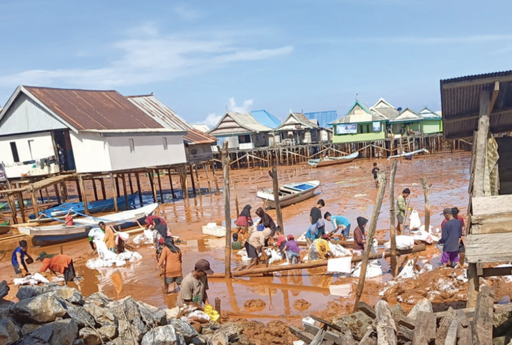JAKARTA — Kasman Amir grew up in a fishing family in a small coastal village on Kabaena Island in eastern Indonesia. The family home sat on stilts above the water, and he recalled waking up to the sound of the boat engine. The village, home to the nomadic Bajau sea tribe — whose culture inspired the Hollywood movie Avatar: The Way of Water — was once surrounded by clear waters that allowed children to play freely. “As kids, we loved playing in the water—swimming, paddling canoes. That was our fun,” Kasman told reporters at a recent press conference in Jakarta. But since 2010, the sea has turned red, allegedly due to runoff from nickel mining, which has expanded across the island. “Now, I never see children swim in the sea. They’re afraid of contamination,” Kasman said. “After school, we’d go fishing right in front of our homes. We’d catch ikan baronang [rabbitfish, genus Siganus], and sell them for pocket money. Children today no longer experience that freedom.” Waters off Baliara Village, Kabaena Island, Southeast Sulawesi, polluted by nickel mining. Image courtesy of Satya Bumi. Kasman’s village is one of the many on the tiny island of Kabaena, at the southeastern tip of the larger island of Sulawesi, that have been severely impacted by nickel mining, according to a new report by environmental local NGOs Satya Bumi, Walhi and Sagori. The report follows a 2024 investigation that focused on the environmental and social impact of nickel mining in the northern part…This article was originally published on Mongabay
From Conservation news via this RSS feed


